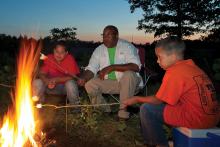Body
Hunters and campers can follow a few easy precautions to protect lives, property, and our precious forests.
Getting to camp
Wildfires can start when fine, dry fuel, such as grass, comes in contact with catalytic converters. Think twice before driving into and across a grassy field.
- Never park over tall, dry grass or piles of leaves that can touch the underside of a vehicle.
- When driving vehicles off-road, regularly inspect the undercarriage to ensure that fuel and brake lines are intact and no oil leaks are apparent.
- Always carry an approved fire extinguisher on vehicles that are used off-road.
Preparing to make your campfire
- Clear a generous zone around fire rings. When humidity is low and wind is high, debris can become tinder for a stray spark or ember.
- Store your unused firewood a good distance from the fire.
- Never use gasoline, kerosene, or any other flammable liquid to start a fire.
- Keep campfires small and controllable.
- Keep fire-extinguishing materials, such as a rake, shovel, and bucket of water, close by in case you need to quench your fire in a hurry.
Never leave a campfire unattended
Extinguish campfires each night and before leaving camp, even if it's just for a few moments.
Practice extra caution in the field
If you smoke, put out your cigarettes completely. Burn them in your campfire or pack them out.
Don't delay a call for help
Call 911 at the first sign of a fire getting out of control.
Report forest arson
Many wildfires are set by vandals. You can stop arson by calling 800-392-1111. Your report will remain anonymous, and rewards are possible.






















